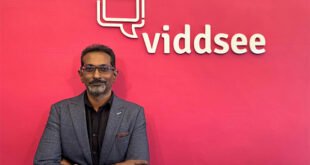Leonardo Aranguibel, VP and head of production operations and strategy for The Walt Disney Company Latin America, discussed creativity’s role amid the rise of artificial intelligence during Content Americas.
Aranguibel spoke about the current state of the industry, emphasizing that “we are, like the entire industry, constantly reinventing and rewriting ourselves. It’s a habit, a way of being, where we seem to need to rewrite the roadmap month by month. Regarding our original productions, we have learned a lot from our mistakes and from the audience, which teaches us something new every day. Additionally, metrics and other data mark our path forward.”
He continued, “We want to preserve that creative spirit that responds to intuition and experience, as these factors continue to guide our way. Intuition remains a fundamental part, but now it is much more marked by the experience of having launched products and content over the years, and seeing how people react, how our audiences react. We have several premieres prepared for the beginning of this year.”
One of the standout productions for this year is El mejor infarto de mi vida, which follows a writer who survives a heart attack and undergoes life-changing experiences with the help of unexpected hosts. Based on Hernán Casciari’s book, the series reflects a heartfelt transformation inspired by real events.
“We obtained the rights together with our friends from Pampa and Gloria Mundi,” Aranguibel commented about the production. “Pablo Bossi, one of the directors, was the one who brought this project to us, and I am very pleased, especially because we have a long-standing relationship with him. The company is putting great effort into this project, which will be released globally. There is a lot of excitement, and I hope you will like it too.”
Aranguibel also highlighted Entre paredes, a romcom starring Aislinn Derbez and Christian Vázquez, which will arrive exclusively on Disney+ on February 12. The series focuses on the romance between Marga (Derbez) and Martín (Vázquez), who meet on a dating app and then discover they live in adjacent apartments.
“It seems incredible that, being such a well-known actress and a figure so loved by the public, this is the first television series she has starred in,” he said. “She has been in various other productions, mainly in cinema and theater. Seeing her in this series is a privilege.”
Aranguibel then discussed new and returning productions and how they will be developing throughout the year. “We have things that are returning and others that are new,” he said. “I believe that, in general, it is a trend that has been imposed in our industry: waiting for the results and performance of content to decide the path to follow in future seasons. Of course, when planning, subsequent seasons are considered but always depending on those results. It is a very competitive market, and we cannot afford to take risks, especially in the difficult times we are living. In lean times, we must be very careful with investments. We always wait to see how things perform. There are projects to which we have much more affection from the perspective of continuity and extension of their life, and we plan them that way. Then we continue developing and adjust according to how the audience responds, because ultimately, the audience sets the pace.”
Speaking specifically about literary adaptations and the challenges generated by audience expectations, Aranguibel explained that “[literary works] are one of many sources where ideas are found to carry out projects. It is not an end in itself. It is not something we are actively seeking. El mejor infarto de mi vida is the story of an author who told his personal experience. We have adapted other things from books, but from a production standpoint, when it comes to telling the story of a person or real events, like a biopic or a historical event, having a book that supports what you are telling offers legal protection. This book was already published, no one has sued over it, or it has been verified by a source that investigated the topic. That helps us, but it is not something we actively seek. If we get it, perfect; if not, that’s fine too.”
The conversation expanded to the impact of artificial intelligence on creative processes and content development. Aranguibel compared AI to nuclear fusion—capable of both groundbreaking advancements and significant risks. He stressed that technology itself is neutral, its impact depends on its application.
“Artificial intelligence is a powerful tool, but also a very dangerous one, depending on how it is used,” Aranguibel commented. “It’s like nuclear fusion: It has enormous potential for good, such as clean energy generation or medical treatments, but it can also be used destructively, like in weapon creation. The same goes for artificial intelligence. It can improve many aspects of our lives, from medicine to education, but it also presents risks if not handled properly. In the end, it is not the technology itself that is good or bad, but how we decide to employ it.”
He added: “I believe artificial intelligence can be very useful, but I don’t see the point of it replacing human ingenuity and capability. I remember something that perhaps many do not remember due to age: When the first compact discs came out and digital recording began, the first CDs had acronyms indicating they were recorded, mixed, and stored digitally. Musicians realized they sounded cold, dry and hard because the digital format has no nuances; it’s all or nothing. To solve this, programs were created that humanized those recordings, adding small details like a violin entering a little later or one that advances, which gave life to the music. That imperfection is what gives the human soul to creation. In my opinion, artificial intelligence cannot replace that, although perhaps in the future advances will be made in that direction.”

